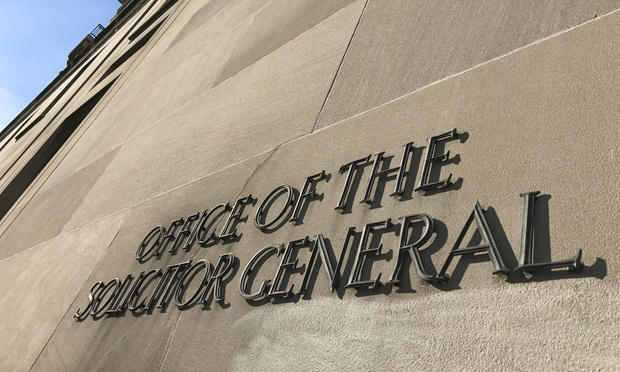 U.S. solicitor general’s office at Main Justice. Credit: Mike Scarcella/ ALM
U.S. solicitor general’s office at Main Justice. Credit: Mike Scarcella/ ALM
U.S. securities officials, acting swiftly to conform to the U.S. Justice Department’s new position in a pending case in the U.S. Supreme Court, on Thursday moved to foreclose new challenges to the lawfulness of the agency’s five administrative law judges.
U.S. Solicitor General Noel Francisco this week notified the high court that the Justice Department was abandoning its defense of the SEC’s hiring process for its in-house judges. Main Justice now considers the commission’s administrative judges “officers” rather than mere employees. The new position raised the bar for the hiring and termination of the agency’s judges.
The commission on Thursday ratified the appointment of the agency’s five administrative law judges. The ratification, the commission said, would “put to rest any claim that administrative proceedings pending before, or presided over by, commission administrative law judges violate the appointments clause” of the Constitution. The five administrative law judges had been hired earlier by agency staff.
The Supreme Court has two cases in front of it that question the lawfulness of the SEC’s administrative law judges—one from the D.C. Circuit, Raymond J. Lucia v. SEC, and the other from the Tenth Circuit, SEC v. Bandimere. The justices haven’t decided whether to take either case.
In August 2016, a three-judge panel of the U.S. Court of Appeals for the D.C. Circuit ruled that SEC ALJs are employees not subject to the appointments clause. The full D.C. Circuit deadlocked 5-5 on the request for rehearing en banc, leaving the panel ruling intact. The Tenth Circuit ruled against the agency.
Francisco wrote in the government’s filing in Lucia: “In prior stages of this case, the government argued that the commission’s ALJs are mere employees rather than ‘officers’ within the meaning of the appointments clause. Upon further consideration, and in light of the implications for the exercise of executive power under Article II, the government is now of the view that such ALJs are officers because they exercise ‘significant authority pursuant to the laws of the United States.’”
Francisco urged the justices to grant review to the Lucia petition, arguing that the constitutional issue “is also extremely important because it affects not merely the commission’s enforcement of the federal securities laws, but also the conduct of adversarial administrative proceedings in other agencies within the government.”
While the SEC has five ALJs, the Social Security Administration, for example, has about 1,400.
The Justice Department had argued in several appellate courts and the Supreme Court that SEC administrative law judges were not “inferior officers” under the appointments clause. In its brief Wednesday, the solicitor general said it now agreed with the Lucia challengers and asked the justices to appoint a lawyer to defend the D.C. Circuit ruling.
Raymond J. Lucia is represented in the high court by Mark Perry of Gibson, Dunn & Crutcher. Supporting amicus briefs have been filed by the U.S. Chamber of Commerce, the Cato Institute, investor Mark Cuban and the Pacific Legal Foundation.
Granting review in Bandimere could be complicated by a possible recusal by Justice Neil Gorsuch who previously sat on the Tenth Circuit. In his Bandimere petition, Francisco suggested the justices might wish to choose Lucia instead because “the government’s petition for rehearing en banc in this case was filed in the court of appeals while Justice Gorsuch was a member of that court.”
There are eight cases raising the issue in federal appellate courts and those cases have been held in abeyance pending any action by the Supreme Court, according to the commission.
In its Thursday order, the commission directed its administrative law judges to reconsider the record and all actions taken in any pending case in which no initial decision has been issued yet. Any matters before the commission in which an initial decision was issued by an administrative law judge will be remanded to the judge for reconsideration. The commission said it is expected to remand 105 cases to its ALJs.
Read the SEC’s order about ratification below:


